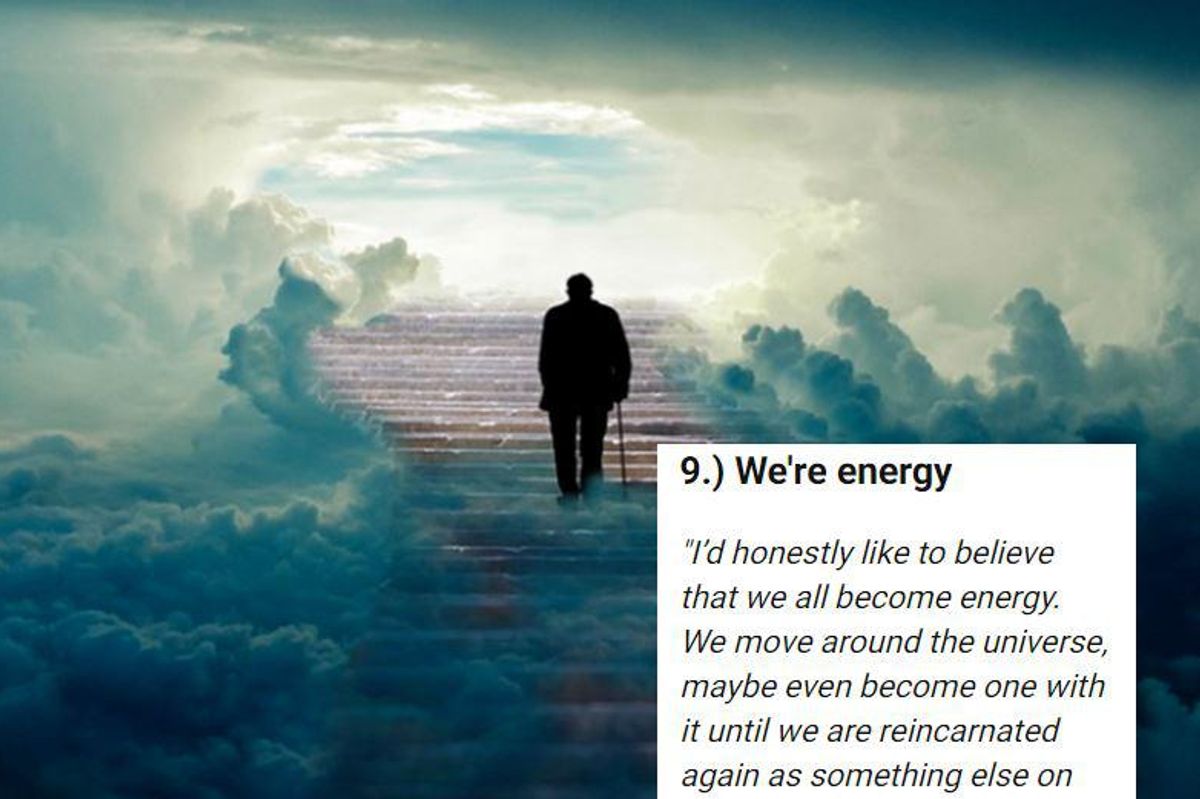People are sharing what they believe happens after we die. The responses are enlightening.
Here are 16 of the best responses.

A man is walking into heaven (or is he?).
One of the funniest and most bizarre things about being a human being is that we really know very little about what’s going on. Sure, many religious people are confident they know why we exist, where we came from and what happens after we die, but there isn’t a whole lot of evidence to suggest they’re correct.
However, even though we are at the center of an incredible mystery, most people are happy to go about their days without worrying about the basic nature of our existence. This has always been very strange to me. Why isn’t the nature of existence the No. 1 question on everyone’s mind the moment they wake up?
There is one thing we do know for sure: that we are all going to die one day. Some people believe that once we flatline we may get invited to heaven where we get to spend all eternity playing the harp, reuniting with old friends and relatives, and enjoying a pain-free, joyous existence.
But as the TV show “The Good Place” suggests, living a perfect life, free of suffering or challenges, eventually becomes pretty forking boring and pointless.
Mark Twain said it best in “Letters from the Earth”:
His heaven is like himself: strange, interesting, astonishing, grotesque. I give you my word, it has not a single feature in it that he actually values. It consists—utterly and entirely—of diversions which he cares next to nothing about, here in the earth, yet is quite sure he will like them in heaven. Isn't it curious? Isn't it interesting?
Many also believe that if there’s a heaven, there’s also hell where the folks who had a good time on Earth wind up. But wouldn’t that get boring, too? Just as one can get accustomed to living in constant beauty, one probably gets acclimated to the heat and suffering down below.
There are also some who believe in reincarnation, so every time we die we are born again as a different species. Cool if you’re a dolphin, bad news if you’re a dung beetle.
Then there are those who believe that nothing supernatural happens. Your consciousness shuts off and things are a lot like before you were born—absolute nothingness. That’s the least interesting option, but according to science, the most likely.
Reddit user throwawayacctlmaooo wanted to find out what posters on the forum thought about life after death, so they asked, “What do you legitimately believe happens after we die?” They received a ton of responses that were outside of the usual “go to heaven/go to hell” variety. What’s cool is that the posts show that a lot of people have widely divergent ideas about what happens after we die.
Here are some of the best responses to the biggest question in life.
1. You're a wave
"No idea, but there is this quote from the TV show 'The Good Place' that I really like and have found comfort in.
"'Picture a wave. In the ocean. You can see it, measure it, its height, the way the sunlight refracts when it passes through. And it's there. And you can see it, you know what it is. It's a wave.
"And then it crashes in the shore and it's gone. But the water is still there. The wave was just a different way for the water to be, for a little while. You know it's one conception of death for Buddhists: the wave returns to the ocean, where it came from and where it's supposed to be.'" — AlexEventstar
2. Our energy moves on
"Our energy — just like that of every living thing before us — will go on and become new things. Soil. Plants. Lions. Toilet paper. Space ship wheel arches. Dragonfly toes. We're all just part of the same system. Neither manufactured nor destroyed. We're just transferring that bestowed upon us from all those before. Death is life." — four__beasts
3. You've been there before
"Just like before you were born. Not good, not bad, just non-existence." — SniffCheck
4. No need to fear
"In the great words of Mark Twain: 'I do not fear death. I had been dead for billions and billions of years before I was born, and had not suffered the slightest inconvenience from it." — Eva__Unit__02
5. One more time
"When I think about it, I come to this very same conclusion. And that terrifies me. The only thing that is a little comforting for me is that, according to some research and according to some people who have experienced Near Death, just before full-on 'nothingness," you relive your life one last time, with an emphasis on the best moments in your life, all being overwhelmed with a feeling of love." — MrXANA91
6. Isn't this reincarnation?
"I think we just keep on hitting a randomize button and we manifest into something else, again and again endlessly." — FarOutSonOfLung
7. The great nothing
"In my opinion, nothing. Like being under anesthesia but never waking up and ceasing to exist." — throwayaacctlmaooo
8. Choose your own adventure
"I'd like to think we reset like a game and we could choose whether we get reborn or go to some sort of heaven or something." — No_But_Yes
9. We're energy
"I’d honestly like to believe that we all become energy. We move around the universe, maybe even become one with it until we are reincarnated again as something else on earth or a different planet." — cheese-emperor
10. Salamanders
"I think we are all reincarnated as salamanders." — Kyky716
11. New universe?
"I believe we go to another universe but that's just wishful thinking." — Zarek_Pumpkineater
12. Incomparable infinity
"I'm under the impression that death is a separate experience we can't comprehend. Like someone with vision will never truly know the concept of blindness or someone with hearing will never know the concept of deafness.
"You only experience it while you're doing it and I am currently experiencing being alive as a human. You don't know what it was like before you were born because you're obviously alive. Just like you don't know deafness because your ears work.
Beyond that, I believe the universe is in endless million-trillion year long cycles of growth and collapse and the fact that I exist at all means, throughout infinity, I am a guaranteed mathematic outcome and must repeat again." — bermudalily
13. Nothing
"Nothing. It's the only answer that makes sense. We ARE our thoughts. Our thoughts are in our brain. When we die, our brain shuts down. So our thoughts no longer exist. Anybody who believes in any form of an afterlife really needs to explain how we can have thoughts without our brain. And if they believe that's somehow magically possible, why do we have brains while still alive?" — joeri1505
14. You become fertilizer
"The same as when trees, plants, or other animals die, we decompose & feed the earth for something else to grow." — skev303
15. May the source be with you
"What I like to believe is that all life comes from a specific energy source and is returned there once we die. Sort of like a big pool of life, where all souls merge after death and cycle back into the world to be reborn. As for what we experience in that form I have no idea. But the entire world lives and functions on cycles, from the food chain to the weather cycle, eveywhere you look there is a cycle to maintain it. So it only makes sense life would work the same way." — doopster77
16. Star stuff
"Your surviving family gets all teary, then buries or burns your lifeless body. As the years pass, what atoms once made you, you, become all mixed up in other things, until much later on when the sun dies and engulfs the earth and all its atoms in a final dance of atomic death. Because we are all made of stars, and to them we will all return." — dbryar
- Why you shouldn't post RIPs on social media - Upworthy ›
- The 3 things you learn after your mother dies. - Upworthy ›
- Do we ever really die? One woman's immortality theory is blowing ... ›
- Everyone needs a death box to save loved ones a ton of work - Upworthy ›
- The 3 things you learn after your mother dies. - Upworthy ›
- Doctor studies near-death experiences, has no fear of death - Upworthy ›
- Woman under anesthesia wants to see her tonsils after they've been removed - Upworthy ›
- Hospice nurse shares 'one sign' someone as a few weeks to live - Upworthy ›
- Woman's 'quantum immortality' theory is blowing people's minds - Upworthy ›
- Hospice nurse says 'shared death experience' convinced her of afterlife - Upworthy ›
- Hospice nurse reveals the 'one sign' that someone is going to die within 4 weeks - Upworthy ›






 A woman is getting angry at her coworker.via
A woman is getting angry at her coworker.via  A man with tape over his mouth.via
A man with tape over his mouth.via  A husband is angry with his wife. via
A husband is angry with his wife. via 
 Austin Powers impersonator arrives at Chase Hofer's apartment.Photo Credit: Kenneth Webb, TikTok
Austin Powers impersonator arrives at Chase Hofer's apartment.Photo Credit: Kenneth Webb, TikTok
 Mom hugging crying daughter
Mom hugging crying daughter Dad kissing child on cheek
Dad kissing child on cheek Mom comforting daughter
Mom comforting daughter

 A blue light painting of an infinity symbol. Photo by
A blue light painting of an infinity symbol. Photo by